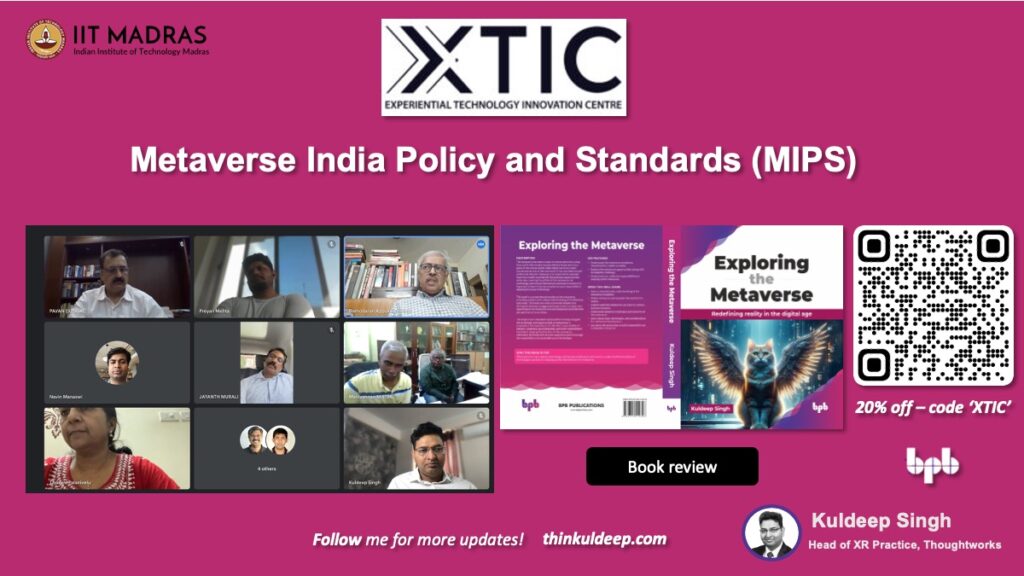-
As part of the MIPS initiative, IIT Madras is leading the way in developing metaverse policies and standards.
-
The eXperiential Technology Innovation Centre (XTIC) is at the center of this initiative, focusing on technical and ethical issues.
-
According to the World Economic Forum, the industrial metaverse is expected to reach $100 billion by 2030.
In anticipation of the sweeping advancements in Web3 technologies, IIT Madras has formulated policies aimed at regulating the burgeoning metaverse sector.
With the metaverse market projected to surge at a remarkable annual growth rate of 37.7 percent over the next six years, reaching a staggering valuation of $74.4 billion by the end of 2024, the need for comprehensive oversight and standards becomes increasingly apparent.
Pioneering Metaverse Policy Development at IIT Madras
At the forefront of this initiative is the eXperiential Technology Innovation Centre (XTIC), an esteemed research and development entity incubated by IIT Madras. Under the banner of XTIC, the institution has initiated the drafting of the ‘Metaverse India Policy and Standards (MIPS),’ signaling a proactive approach towards shaping the future trajectory of the metaverse landscape in the country.
Central to the MIPS initiative is establishing a specialized committee conducting in-depth research on the prevailing use cases and potential pitfalls within the existing metaverse ecosystem.
This committee is dedicated to addressing both technical and ethical challenges, with the overarching goal of enhancing the safety and sophistication of industrial applications of this transformative digital technology.
Renowned industry veteran Rahul Sethi, who recently spearheaded the launch of a metaverse experience center in Noida, is among the esteemed members of the MIPS committee.

A recent report from the World Economic Forum (WEF) highlights that the industrial metaverse will emerge as a $100 billion global market globally by 2030. This transformative paradigm shift is set to revolutionize various sectors, including manufacturing, education, healthcare, gaming, and enterprise.
By harnessing the convergence of digital twins, spatial computing, artificial intelligence (AI), Web3, and blockchain technologies, the metaverse promises to propel the next phase of the industrial revolution.
ALSO, READ; Navigating the Future of Europe’s Metaverse: The Influence of Teamwork.
As IIT Madras spearheads the development of metaverse policies and standards, the MIPS committee is poised to analyze the multifaceted impacts of this groundbreaking technology across diverse sectors.
From education to healthcare, gaming, and enterprise, the committee will explore strategies to maximize the benefits of the metaverse while addressing critical ethical, privacy, and security concerns.
Through collaborative efforts with industry, academia, and government stakeholders, IIT Madras aims to pave the way for a robust and inclusive metaverse ecosystem that fosters innovation, growth, and societal well-being.
In parallel, China has also taken strides in establishing standards for exploring and utilizing the metaverse within its borders, highlighting the global significance and collaborative nature of metaverse policy development efforts.
As nations worldwide embark on this transformative journey, collaboration and dialogue will be vital in shaping a cohesive regulatory framework that ensures the responsible and equitable evolution of the metaverse landscape.
ALSO, READ; Wilder World Metaverse on Samsung TVs: Web3 Gaming Revolution.
As the metaverse landscape evolves rapidly, navigating regulatory complexities remains a formidable challenge. Balancing innovation with the need for consumer protection, privacy, and security requires careful deliberation and collaboration among stakeholders.
IIT Madras aims to develop a regulatory framework that fosters innovation while safeguarding against potential risks by fostering an open dialogue with regulators, policymakers, and industry players.
Ethical considerations lie at the heart of metaverse policy development. From ensuring inclusivity and accessibility to addressing data privacy and digital rights concerns, the MIPS committee is committed to promoting ethical development and responsible use of metaverse technologies.
By integrating ethical guidelines into policy frameworks, IIT Madras seeks to build a metaverse ecosystem that upholds fundamental fairness, transparency, and accountability principles.
Central to IIT Madras’ mission is the empowerment of innovation and entrepreneurship in the metaverse. The institution aims to catalyze the development of cutting-edge metaverse solutions by providing support and resources to budding entrepreneurs and startups.
IIT Madras seeks to nurture a vibrant ecosystem of innovators driving the frontiers of metaverse technology through initiatives such as incubation programs, funding opportunities, and mentorship.
Collaboration lies at the heart of metaverse policy development. IIT Madras aims to leverage collective expertise and insights to address complex challenges and unlock new opportunities by fostering partnerships with industry leaders, academic institutions, and government agencies.
Through knowledge exchange initiatives, workshops, and conferences, the institution seeks to facilitate dialogue and collaboration among diverse stakeholders, driving the evolution of the metaverse ecosystem.
As IIT Madras continues to spearhead the development of metaverse policies and standards, the institution remains committed to fostering an inclusive, ethical, and innovative metaverse ecosystem.
IIT Madras aims to position India as a global leader in metaverse innovation by addressing key challenges, promoting responsible use, and fostering collaboration.
With a shared vision and collaborative spirit, stakeholders across sectors can work together to realize the full potential of the metaverse and shape a future where digital experiences are immersive, accessible, and empowering for all.
